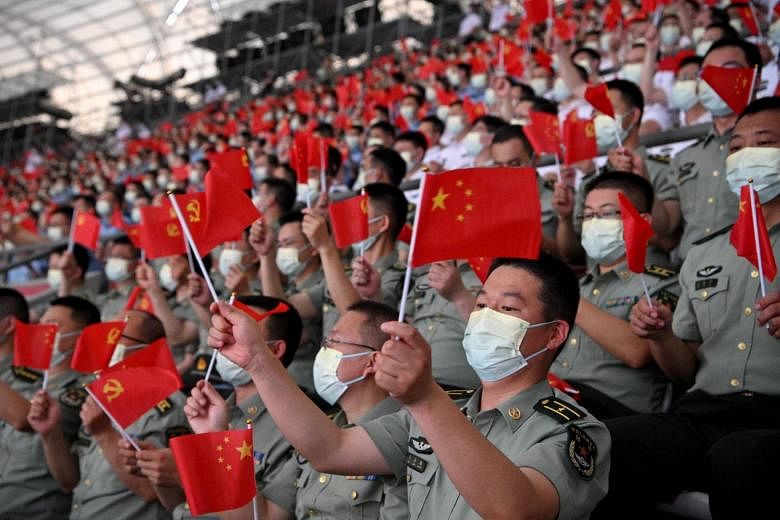WASHINGTON - Singaporeans have more positive views on China than most people in other advanced economies, who continue to view China in a broadly negative light, according to a survey report published on Wednesday (June 30).
And although the images of both the United States and China were at or near historic lows last year, the US has since seen a turnaround in public opinion across 17 advanced economies, while most continue to see China unfavourably.
Singaporeans bucked the trend by being the only group to view China in a better light than the United States, and to prefer stronger economic ties with China over the US, in the Pew Research Centre's Spring 2021 Global Attitudes Survey.
They also give China top marks for its handling of the pandemic and express high confidence in Chinese President Xi Jinping, a departure from how Mr Xi is panned everywhere else.
This was the first time Singaporeans were part of the regular survey, which polled a total of nearly 19,000 people across 17 advanced economies in the Asia-Pacific, Europe and North America.
In all, 1,124 Singaporean adults were interviewed over the phone in Malay, English or Mandarin in March and April this year.
Singaporeans are largely outliers in the survey. Negative views of China hit or remain near historic highs in most advanced economies compared with last year, and a median of only 27 per cent across the 17 populations have a favourable opinion of China.
In contrast, 64 per cent of Singaporeans have a favourable view of China.
This stands out from the rest of the Asia-Pacific region, where a median of 73 per cent see China in a negative light. Japan has the most negative views, with roughly nine in 10 seeing China negatively. And two-thirds or more in Australia, South Korea, Taiwan and New Zealand have mostly negative views of China.
While views of China have remained largely negative, positive views of the US have rebounded since last year, when Republican President Donald Trump was in office and the country was hit hard by the pandemic.
In summer last year, a median of 34 per cent across 13 countries had favourable views of the US, while 24 per cent viewed China positively.
Now, a median of 61 per cent have favourable views of America, compared with the 27 per cent for China.
"These broadly positive views reflect a significant shift since last summer, when ratings of the US were at or near historic lows in most countries," the Pew report noted.
Correspondingly, confidence in Mr Xi to do the right thing in world affairs stayed at or near historic lows in most places, while confidence in America's president rose substantially since Democrat Joe Biden took office early this year.
A median of 77 per cent had no confidence in Mr Xi, although 70 per cent of Singaporeans surveyed expressed confidence in him - the same level of confidence as they had in Mr Biden.

Most people also say it is more important to have strong economic ties with the US than with China.
This preference for economic ties with the US has grown significantly in recent years in Australia, Canada, Japan and South Korea, the report noted.
Since the question was last asked in 2019, Australians are 16 percentage points more likely to value close economic ties with the US, while the increase is 14 percentage points for Canada, 11 for Japan, and 9 for South Korea.
"Notably, this preference comes despite the fact that as of 2020, more people name China over the US as the world's leading economic power, particularly in Europe," said the Pew report.
Older adults tend to be more critical of China and to prefer economic ties with America than younger adults, except in Singapore, Taiwan and South Korea, where the trend is reversed. There, older adults evaluate China more positively in general, and prefer close economic ties to China.
Ethnic and national identities were also found to play a role in attitudes in Taiwan and Singapore.
The report noted that in Taiwan, people who identify as Chinese and Taiwanese - rather than as only Taiwanese - tend to prioritise economic relations with China over the US and have more favourable views of China.
In Singapore, there were similar differences of opinion between the ethnic groups of Chinese, Malays and Indians, the report noted.
About 72 per cent of Chinese Singaporeans have favourable views of China, compared with 45 per cent of Malay Singaporeans and 52 per cent of Indian Singaporeans.
Asked about Singapore's divergence from the overall negative views of China, the report's lead author Laura Silver told The Straits Times: "This is the first time we have surveyed in Singapore, so we are also not able to see whether these views in Singapore - which are certainly more positive toward China than in the other (places) we surveyed - are up or down or unchanged compared to the past.
"That said, one of the factors that certainly stand out in Singapore is the high percentage of people who identify as ethnically Chinese, and we also see that ethnic Chinese tend to be more positive toward China than ethnic Malays or Indians."


